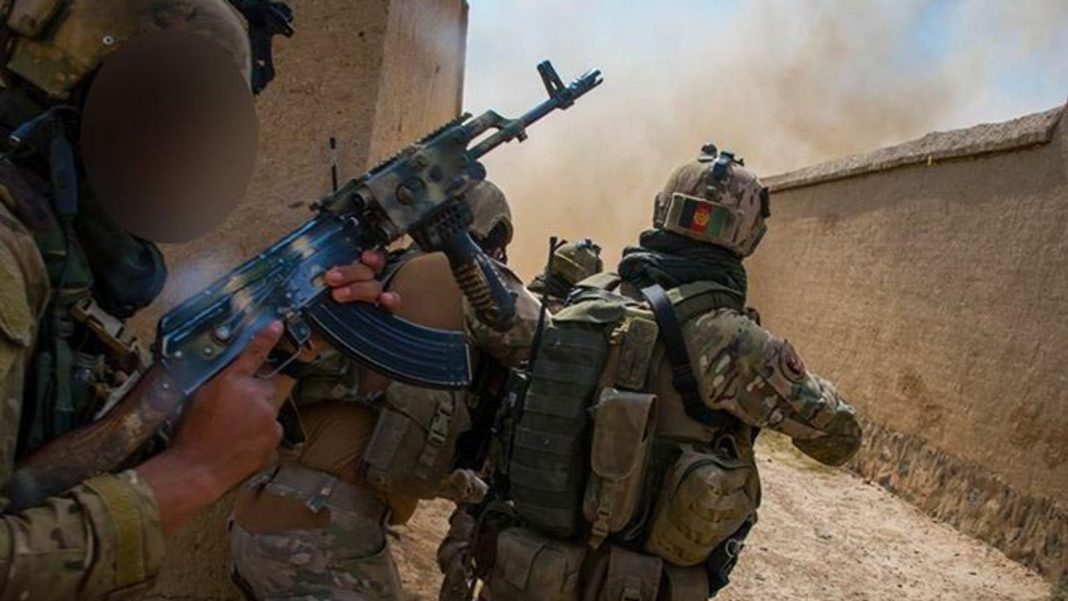“I feel betrayed by the British.”
Once part of an elite Afghan special forces unit, Shaheen and his two brothers spent years fighting side-by-side with UK commandos.
But when Kabul fell to the Taliban in the chaos of August 2021, so many of his comrades were left behind. His brother Qahraman was hunted down and murdered.
“We were like one family,” he says. “I cannot bear to hear about my colleagues hiding now in Afghanistan, their lives in danger.”
Sky News can reveal that dozens of soldiers who served in two Afghan special forces units that were set up, trained and paid for by the British have since been murdered or tortured by the Taliban.
Working with Lighthouse Reports and The Independent, Sky News has verified dozens of cases in which the Taliban has targeted and physically harmed these former commandos who risked their lives alongside the British.
Members of the Triples with British veteran Charlie Herbert
Shaheen told Sky News how for years he and his two brothers were part of Commando Force 333 (CF333), an Afghan special forces unit established by the British in 2002.
His name and the name of his brother have been changed in this story for his family’s protection.
In the mid-2000s, there were still pockets of Taliban fighters dotted around Afghanistan, despite their regime being toppled by the coalition of international forces, including the US and UK.
Known as the Triples, CF333 and fellow unit ATF444 embarked on joint missions with the British to battle the remaining Taliban – and received salaries from the British government for doing so, it can be revealed for the first time.
The camp where they and British commandos were based became a home for Shaheen and his brothers, he tells Sky News.
They took pride in their work and were involved in special operations around Afghanistan, putting themselves in danger for their country.
“Although they were younger than me, my brothers and I were so close that we were friends,” Shaheen says.

Shaheen says he has lost everything
Chaos as Kabul fell to the Taliban
With the US and UK announcing they were pulling out of Afghanistan after two decades, Taliban fighters swept across the country and it wasn’t long before they were at the gates of Kabul.
“I didn’t know what to do,” Shaheen says. “I didn’t go back home because I would be a top target for the Taliban.
“So for two days, I was wandering in the streets of Kabul, not knowing when I would be killed.”
Along with Qahraman and some of their comrades, Shaheen was able to get inside the airport, the last part of the city not under Taliban control. Their other brother had managed to leave Afghanistan by crossing the border elsewhere.
“The conditions were horrible at the airport,” Shaheen says. “I saw women and children being stampeded upon. People were beaten with batons, it was horrendous.”
While Shaheen was allowed on a flight out of Afghanistan, his brother was turned away.
Please use Chrome browser for a more accessible video player
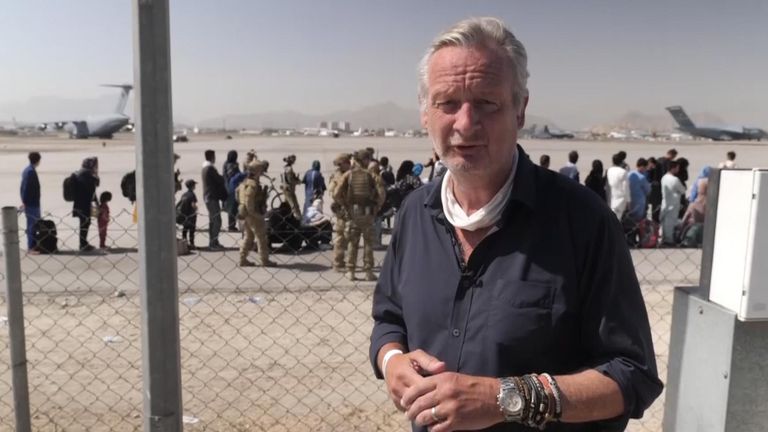
1:21
Sky’s chief correspondent Stuart Ramsay reporting from Kabul airport in 2021
Qahraman hunted down by the Taliban
Shaheen says after Qahraman left the airport “he was observed and followed”, and went to their sister’s home.
He did not leave the house for 10 days. When he finally did, a group of people shot him.
Asked if he blames the British for his brother’s death, Shaheen says: “He did a lot of hard work for the British. When he was kicked out of the airport, he became a target.”
Now living in Birmingham with his wife and children in a cramped house, Shaheen says he is a shell of his former self.
“I lost everything,” he says.
“I don’t even have 10% of what I was. Even here, I don’t have anything to be proud of.”
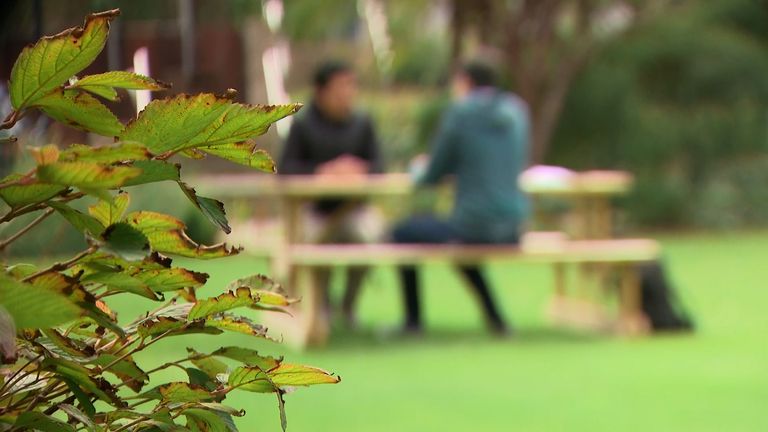
Shaheen speaks to Sky News reporter Michael Drummond
‘Unjust’ reason to deny Triples entry to UK
Despite serving shoulder-to-shoulder with British troops, the majority of the Triples were not evacuated in August 2021 and have subsequently been rejected under the UK’s scheme for relocating Afghans who worked with the British – known as the Afghan Relocation and Assistance programme (ARAP).
Most have been told this is because they did not work “alongside, in partnership with or closely supporting… a UK government department” – despite compelling evidence to the contrary.
One British veteran, who served alongside the Triples for five years, said the relationship between the Afghan and UK units was a “completely symbiotic partnership”.
“We were completely embedded,” the veteran said. “We were one unit. You couldn’t work more hand in glove with the British than they did.”
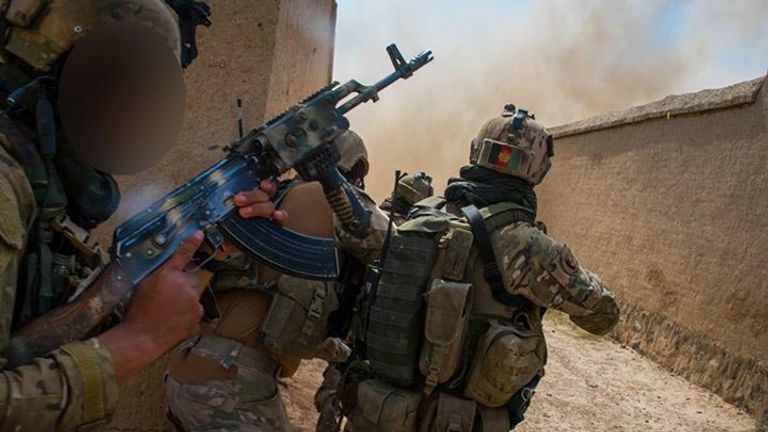
Members of the Triples during training with British forces
Charlie Herbert, a former British Army major general who served in Afghanistan, said denying the Triples entry to the UK on the basis that they did not work alongside, work in partnership with or closely support the UK armed forces, is “both disingenuous and unjust”.
He added: “I can think of no other Afghan security forces who were more closely aligned to the UK than 333 and 444, nor who more loyally or bravely supported our military objectives.”
Another veteran, who served alongside the CF333s, said: “They put their lives on the line, properly fighting with us, for us. They were the national force doing the UK government’s bidding. That cannot be more aligned with the UK’s strategic interests.”
Conversations with current and former UK Ministry of Defence (MoD) sources suggest that the UK Special Forces department was effectively “blocking” the Triples from being accepted under ARAP.
It is unclear why.
Read more from Sky News:
Afghanistan: How the US lost its longest war
The story of how the ‘greatest military force’ abandoned Afghanistan
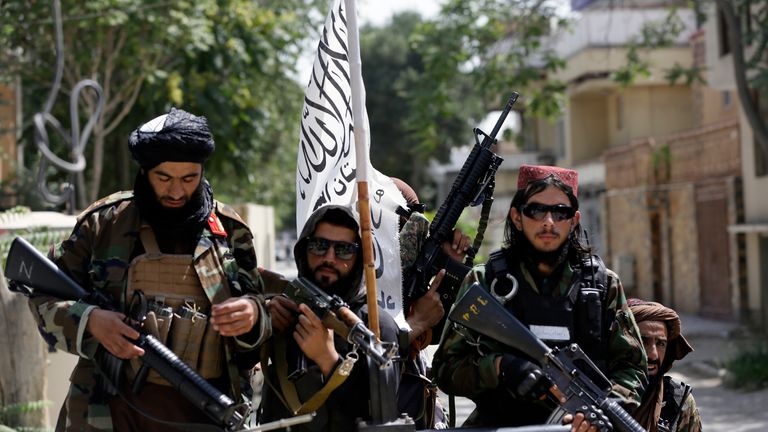
Taliban fighters in Kabul in August 2021 after their takeover. Pic: AP
Ministry of Defence: We have never issued blanket decisions
When approached, the MoD did not deny that UK Special Forces was refusing to approve the cases.
An MoD spokesperson said: “The UK government has made an ambitious and generous commitment to help eligible people in Afghanistan. So far, we have brought around 24,600 people to safety, including thousands of people eligible for our Afghan schemes.
“The MoD has never issued blanket decisions on applications from any cohort who have applied to the ARAP scheme. All eligibility decisions are made on a case-by-case basis against strict criteria taken in accordance with the Immigration Rules and based on the evidence provided by individuals.”
Shaheen, like so many of his surviving comrades, wants to know why they were left behind and for the apparent block on Triples applications to be lifted.
But for so many, it is already too late. They have already been hunted down by the Taliban.
“There’s a saying in my country,” Shaheen says. “On one hand, there’s a cliff – and on the other, is a tiger waiting for you, so you don’t have much choice.”
Story in cooperation with: May Bulman, investigations editor at Lighthouse Reports, Fahim Abed, investigations editor at Lighthouse Reports and Monica C Camacho, OSINT reporter at Lighthouse Reports
Additional reporting by Katy Scholes, Sky News international producer


